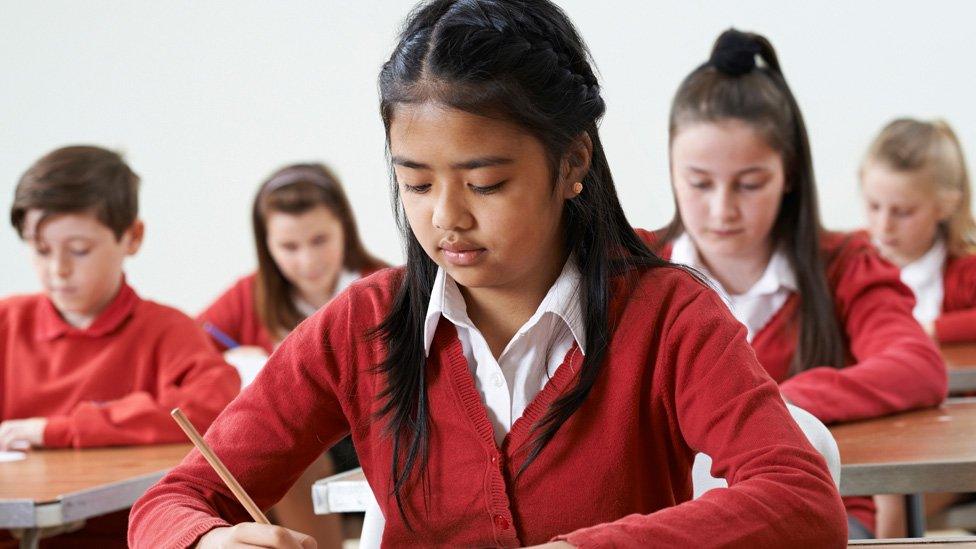Sats: Can you answer the questions from this year's English test?
- Published
- comments

The details of the Sats English test taken by Year 6 pupils in England has been shared by the government, after complaints by some parents and teachers that this year's test was too tough.
Concerns have been raised about its length and how difficult some of the question were, with some parents and teachers saying that children were unable to finish it.
Standard Assessment Tests, or Sats, are tests that children in Year Six in England take, to measure their progress before they go to secondary school.
They are national curriculum assessments in English grammar, punctuation and spelling, English reading and maths.
The test wasn't taken by pupils in Scotland, Wales or Northern Ireland as decisions about education there are taken by the local governments in each nation.
Why do some people think the test was too hard?
In the English Sats test, children had one hour to answer 38 questions about three pieces of writing.
The first piece of writing was an extract from a story about friends who believe they have come across sheep "rustlers", which is a term for someone who steals animals from farms.
Another was an interview about bats in Texas, which was based on an article from newspaper the New York Times.
The final passage was taken from a book called "The Rise of Wolves".
One question asked 10 and 11-year-olds to find a similar word to "eat" in a passage.
One teacher said they were concerned that the answer was "consume" but many children would have written "feeding", as both words appeared in the text.
> According to the mark scheme, both answers were acceptable.
In another question children were asked what state in United States had been mentioned.
The answer is Texas but a teacher told the 大象传媒 many children might have written Austin, the name of the city - as they wouldn't likely know enough about American geography to know that Austin is not a state.
Another concern from parents and teachers was that many students ran out of time, and so simply weren't able to answer all of the questions.
Based on the number of words in the paper and time average reading speed of a 10-11 year old, pupils had an average of 49 seconds per question to scan back through the relevant passage, work out their answer and write it down.
Last year's Sats reading test had less text and asked three fewer questions, which meant pupils had more time to answer each question - on average, a minute, to find and record each answer.
Simon Kidwell vice-president of the National Association of Head Teachers, was also concerned about the sequencing of the questions.
Normally tests begin with easier questions to help children settle down, and gradually get harder, but this paper opened with three more challenging questions, which required children to infer and explain, rather than simply find answers from the text.
What has the government said about the test?
The Department for Education (DfE) said the Sats were "rigorously trialled", and that the tests are "an important way of identifying pupils' strengths and where they may have fallen behind as they head to secondary school".
Schools minister Nick Gibb says the tests are meant to be challenging but not "too hard" as that is "not the purpose" of the assessment.
However he also said that the tests were tested themselves and that the Standards and Testing Agency (STA), has to make sure that they are "appropriate for this age group".
The NAHT has raised concerns with the STA who deliver the assessments, and Ofqual, England's exams regulator.
Gillian Hillier, chief executive of the STA said that the tests "trialled with thousands of pupils" last April and had been developed over "at least three years".
She added that lots of measures are taken to ensure the tests are "appropriate and fair", and of a "similar difficulty to those in previous years".
Do you want to try some of the questions for yourself? Read each of the passages of text and then answer the questions.
You can let us know what you think in the comments.
Some children said they didn't know what sheep rustlers were - but it did also use the word sheep thieves elsewhere on the page
This article was taken from The New York Times, an adult newspaper - which teachers said wasn't the right reading age for 10-11 year olds
Teachers were also concerned that some children would be at a disadvantage if they didn't have background knowledge of the subject, for example having never been camping or having never seen a bat
- Published15 May 2023
- Published17 May 2019
